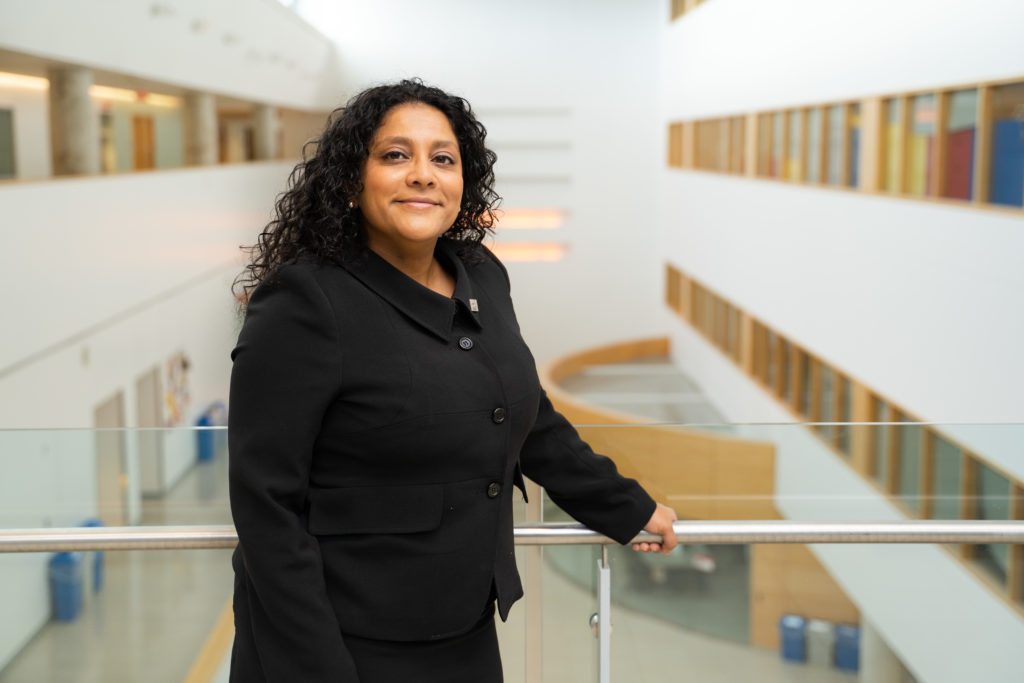
Pictured here: Rebecca Pillai Riddell
We all want to be healthier, but the path to great health is different for each of us. Thanks to wearable technology, virtual medical appointments and apps to help us stay on track, getting healthy and staying healthy has never been more convenient. But no technological advancement replaces ground-breaking discoveries and the inspired researchers who seek knowledge to end diseases – and address ways to improve health – for good.
This year, two of York’s esteemed scholars have been elected to the Canadian Academy of Health Sciences:
Rebecca Pillai Riddell has focused her research in the pediatric behavioural and biobehavioural sciences. She built the first and largest study in the world studying young children through painful vaccinations over the first years of life. She has generated an unrivalled published literature on the biopsychosocial dimensions of infants’ and young children’s acute pain . She used this work to influence global vaccination practice around the world through contributing to WHO clinical practice guidelines for vaccination and her knowledge mobilization work to put pediatric pain science in the hands of families. She is also a fierce advocate for equity, diversity, and inclusion within the academic research ecosystem.
Professor Steven J. Hoffman is the Dahdaleh Distinguished Chair in Global Governance & Legal Epidemiology and a professor of Global Health, Law and Political Science, the Director of the Global Strategy Lab, the Director of the WHO Collaborating Centre on Global Governance of Antimicrobial Resistance, and the Scientific Director of the CIHR Institute of Population & Public Health at the Canadian Institutes of Health Research. He is an advisor to governments and the United Nations and is frequently called upon by media to share his knowledge in global health.
York University is also home to the Dahdaleh Institute for Global Health Research, founded in 2015 thanks to a generous donation from Victor Phillip Dahdaleh, the largest alumnus donation York has ever received.
The Dahdaleh Institute supports critical problem-solving approaches to pursue effectiveness, equity and excellence in global health. The Institute includes global health leaders, teachers, researchers, practitioners and students, all working at the cross-section of research, policy and practice, to address 21st-century global health challenges and improve people’s lives.
York’s community of interdisciplinary health scholars research, teach and collaborate in three key areas:
Global Health Foresighting
The Dahdaleh Institute pursues innovative and interdisciplinary approaches to design more effective, just and equitable solutions that address the health challenges for people around the world.
This year, the Institute announced five new seed grants to support research in areas such as the impact of COVID-19 in sub-Saharan Africa and the health effects of sanctions. Through a broad scope of research focused on supporting social justice goals, academics and researchers make a difference by engaging with people working in public health around the world.
Planetary Health
A planetary health perspective looks at human health as the relationship between human systems and the natural systems we all live in. Focused research calls urgent attention to the health of human civilization, the state of the natural systems, the ecological boundaries on which our health depends, and the relationships and dynamics between them.
Global Health and Humanitarianism
Focused efforts are underway to improve the clinical public health effectiveness of humanitarian response. Through scientific research and discovery, technological innovation and critical perspectives that address the realities of contemporary humanitarian policy and practice, the Institute’s research has a direct impact on the health of people around the world.
As a university-wide organized research unit, the Dahdaleh Institute has six founding Faculties: Faculty of Education, Faculty of Environmental and Urban Change, Faculty of Health, Faculty of Liberal Arts & Professional Studies, Lassonde School of Engineering, and Osgoode Hall Law School, and working affiliations with the Faculty of Science and the School of the Arts, Media, Performance & Design.
The Dahdaleh Institute is widely recognized for its collaborative and transdisciplinary research, its meaningful impacts, and its leadership in fostering a new generation of global health scholars and practitioners.
